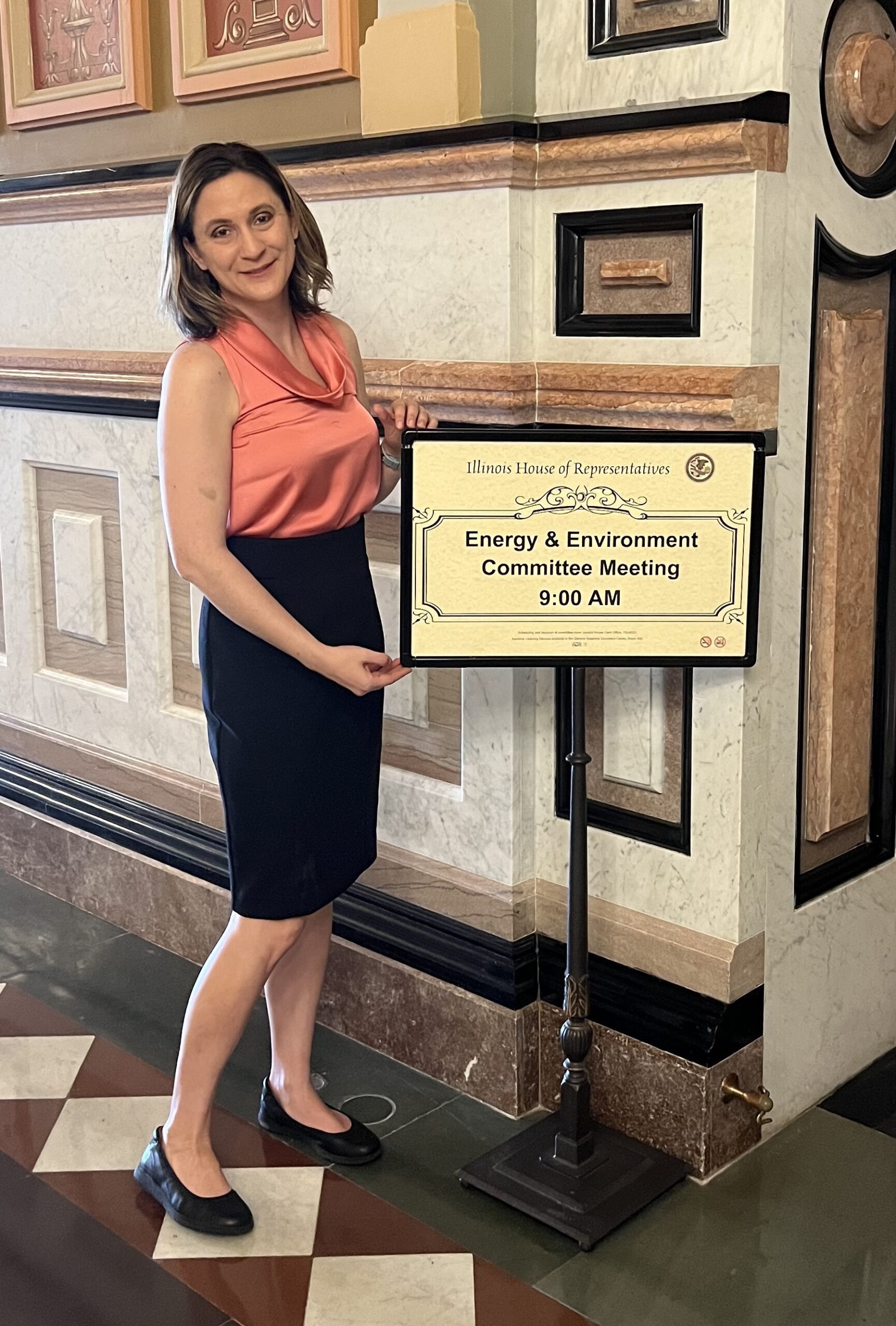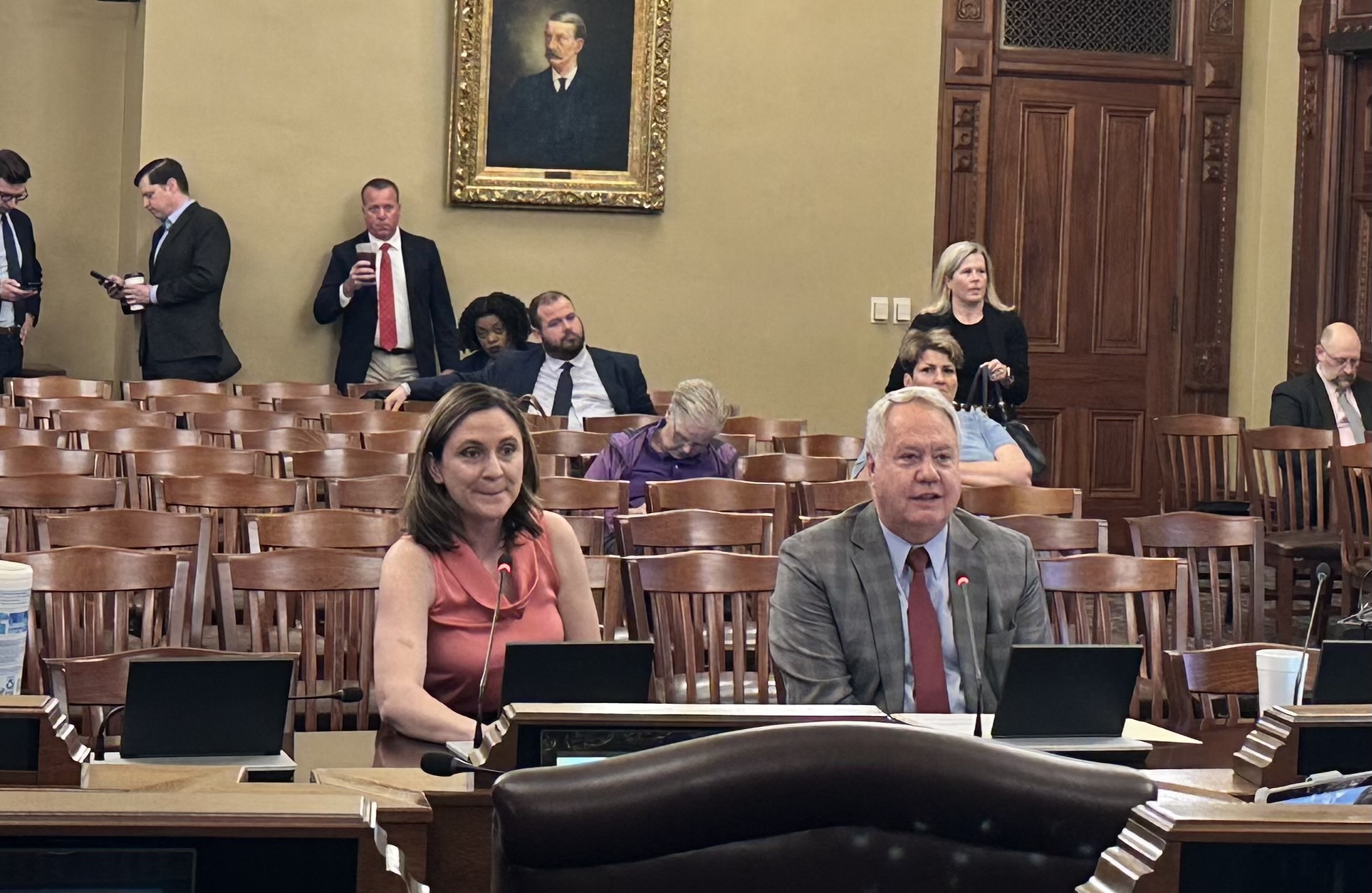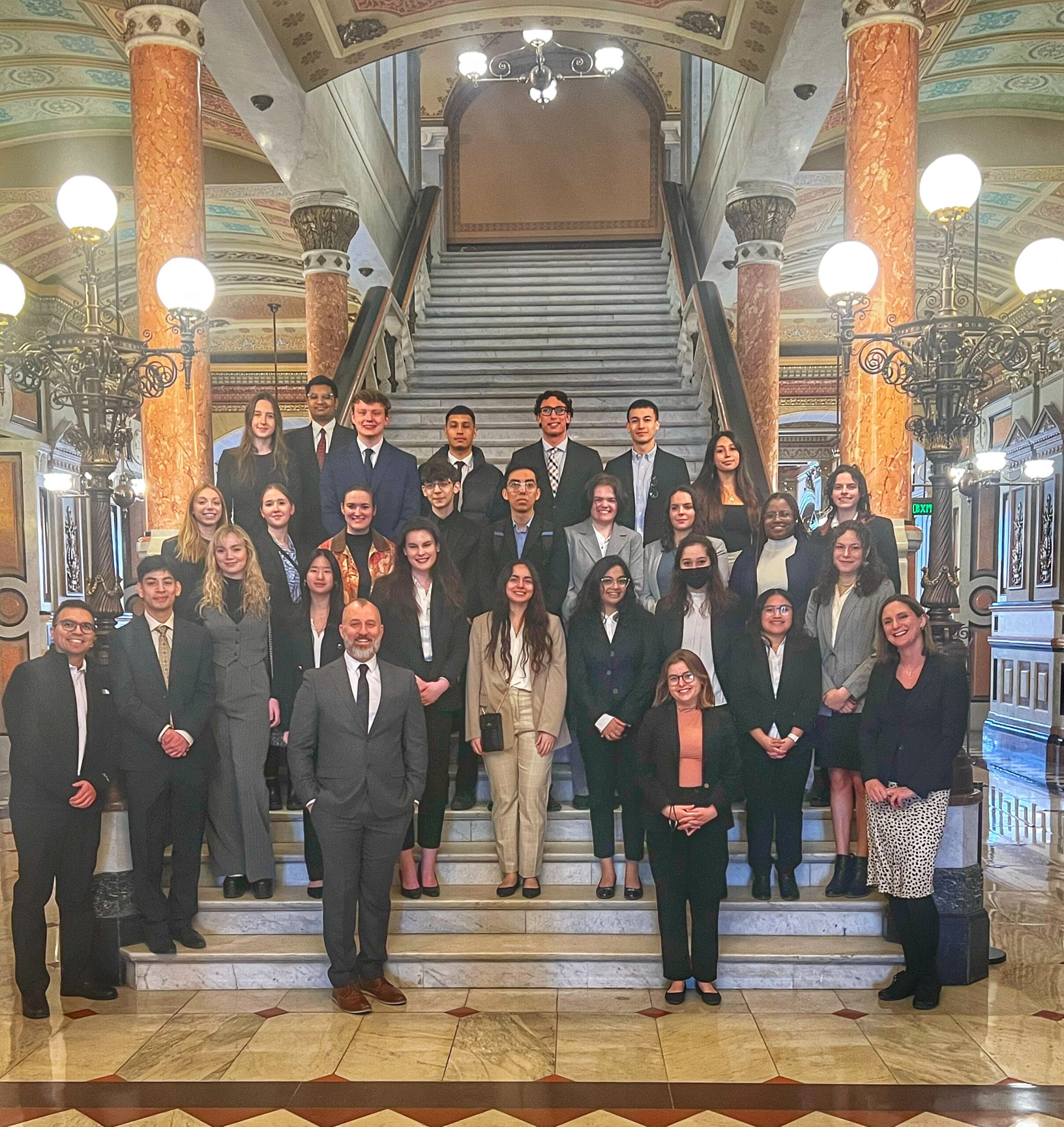
Walling at the Illinois House of Representatives
For over two decades, U of I alumna Jennifer Walling has dedicated her life to fighting for environmental progress. During her time as an undergrad in Natural Resources and Environmental Sciences, Walling got her start with environmental advocacy through the Students for Environmental Concerns (SECS) registered student organization. As SECS president in 2003, she played a major role in the passing of U of I’s very first clean energy fee: a major step toward campus sustainability. Walling also helped to found the Student Sustainability Committee (SSC), the group that manages the funding accumulated from student sustainability fees.
Now, as the executive director of the Illinois Environmental Council, a legislative advocacy group, she is able to create change on an even larger level. Walling still works closely with the university, maintaining roles as a faculty member and a serving on various advisory committees, including iSEE’s Environmental Leadership Program. Ahead of the coming semester, iSEE’s Kratika Tandon sat down with her for a Q&A.
Kratika Tandon: How long have you been the Executive Director of the Illinois Environmental Council?
Jennifer Walling: It’s been more than 12 years since I started this role in January 2011.
KT: What does your professional background look like? What did you study before starting with the IEC?
JW: I have a bachelors in Natural Resources and Environmental Sciences from the University of Illinois. After getting this degree in 2003, I received a master’s and law degree through the joint degree program. My undergraduate and graduate degrees were very science-oriented. I studied mercury and water, but I knew I really didn’t want to work in a lab. I did a lot of different internships during high school and college, and everything boiled down to the fact that I was ultimately interested in some sort of lobbying or advocacy work. After I graduated, I started working at the Environmental Law & Policy Center, which is a public interest nonprofit law firm. I was there for a year and a half before I made a move over to work as Chief of Staff for State Senator Heather Steans, where I was for three years before taking my current job.
KT: You mentioned that you got a law degree, but you don’t practice law and you never have?
JW: I have an active attorney license, but I don’t practice, and I have never been to court. I do some things that I believe have benefited from my law degree, but I really didn’t need that degree to be successful in the work I’m doing now.
KT: How did you first get involved with the Illinois Environmental Council, and what made you realize that this organization would be a good fit for you?
JW: I learned about this organization and about the work that they were doing in Springfield when I was in college. At that time, the IEC was more of a generic environmental think tank and education center that did some lobbying and advocacy work. When I got involved, many of the members already had an established niche, and my position was also just the perfect niche for me, because it was focused on advocacy and lobbying in the environmental space. This position matched my interests of advocacy, state-level lobbying, and working on anything and everything having to do with the environment.
KT: What has your IEC role provided for you, and likewise, what have you been able to bring to the organization?
JW: I think what has made us successful is finding a niche and sticking to it. Our niche is working on advocacy that is directly related to environmental issues. We’re not just a generic environmental education group; we work specifically on informing lawmakers and building our influence so we can pass the best environmental policies. Everything that we do is focused on our priorities of where we want to go and ensuring that we’re headed in the right direction. We don’t take money to run programs or talk to children’s groups — doing generic education for the public. That’s not the work we do, and our funders know and appreciate that. We might need to occasionally turn down some opportunities because they want to take us out of the work we’re supposed to be doing, but I think that’s part of what has made us tremendously successful.
KT: Can you detail the responsibilities that your position entails? What might a day, or even a week, in your life look like?
JW: I balance running the organization as an executive and working with our program as a registered lobbyist. I make sure that we’re raising enough money, finances are flowing correctly, our board is meeting, our employee handbook is right, managing staff and policies, and making sure that everyone’s working together; all those sorts of things are among my responsibilities as executive manager. That is a piece of it. Taking a look at a week in my life is interesting right now. Mondays tend to be the days when I’m in Chicago with my Chicago staff. On Mondays, I meet with all 20 of our staff. I check in with my four directors: our development, communications, finance, and programs and policy leads. I’m meeting with those four people and just figuring out what’s going on: what issues they’re facing and what they need help with; that takes up a lot of the day. On Tuesdays, I usually head down to Springfield and prepare for a day of lobbying the state legislature. There’s a bit of a schedule to Tuesdays, because on Tuesdays at around 4 p.m., the House Energy and Environment Committee meets. Once I arrive in Springfield, I’m usually chasing down votes from people I haven’t talked to already that need to vote for something to get out of committee. We then have the committee meeting and run everything through to see how it goes. Sometimes there’s really exciting things.

Walling testifies with Illinois State Representative Jay Hoffman
Last week, we moved a crucial bill banning Styrofoam, which I’m so excited about, and I really believe we’re going to be able to at least move it out of the House*. On Wednesdays, we have some committee meetings, usually only with one or two bills. Thursdays usually have Senate Energy and Senate Environment meetings. Our staff splits up and goes to those different committees. There are receptions and dinners that I attend in the evenings to network with lawmakers and other lobbyists to make sure that I’m kept up to date on anything that might be going on. I really enjoy that work. In the 48 hours spanning from Tuesday at noon to Thursday at noon, we get a lot of things done. Friday and Saturday are spent wrapping things up, making sure that we’re writing something to go out to our email list to keep people updated. On Friday, IEC hosts a call with dozens of our member organizations, such as NRDC, Sierra Club, and Faith in Place, as well as many community-based organizations and issue organizations to discuss the priorities for the week. I spend the rest of Friday trying to prepare for the upcoming week in terms of legislation, and anything we might need to do in terms of key funder updates. That’s usually how January through May works. We don’t have legislative session after May, so it’s a little less exhausting then.
KT: What do you do for the rest of the year?
JW: That time is spent focusing on relationships. We do a lot of partnership building with our member affiliates, going to different member organizations.
There’s a lot of staff management and fundraising work that I do the rest of the year—especially fundraising. We have a big gala in September that we spend months preparing for. I also try to do a lot of fun stuff with lawmakers. We like to take them on farm tours and canoe trips, we all go down to a trip to Southern Illinois every year. In my personal life, I go to a lot of fundraisers and galas, because it is crucial to build those relationships with lawmakers. I do a lot of politics outside of work to help me be better at my job during the day.
KT: What are some of the current key legislative priorities on IEC’s radar? What have you worked on in the past and do you have any plans for future priorities?
JW: I’ve got a whole document of bills that we focus on, but I can give you a few examples. We’re really prioritizing environmental justice, and we have a big bill about the cumulative impact of air pollution sources that we hope to get passed this year. We got it out of the House last year, but we haven’t gotten around to the Senate yet because it keeps running into problems there. Regarding transportation, we’re very focused on the electrification of the transportation sector, specifically public transit buses, school buses, trucks, and cars. We’re also working a lot on pedestrian safety and public transit. We’re talking a lot these days about carbon capture and storage in the energy realm. We have a bill that proactively regulates this process to protect landowners and the environment. We’re also always working on natural gas and how to transition buildings off natural gas, so that’s a big one. In terms of sustainable agriculture, we’re working on strengthening restrictions on pesticides or increasing violations for pesticides that have been sprayed improperly.
One of the bills I mentioned earlier, which is a huge one, involves working on Styrofoam. We really would like to ban it this year, so we’ve been focusing a lot of our efforts on the polystyrene ban. I would say energy and plastics are what we spend the most time on. We are working on bills regarding composting, flooding, resiliency, recreation in waterways. PFAS (per- and polyfluoroalkyl substances) are also a huge concern this year. The bottom line is that there are always a lot of priorities.
KT: What is your favorite part of working as the executive director of IEC, and what do you find most rewarding about the work you’ve done?
JW: My favorite part is when a big bill passes and has such a huge impact on the people of the states that we work with. We passed the Climate & Equitable Jobs Act in 2021, and this bill was incredibly important to the whole state; it will move Illinois to 100% clean energy by 2045. This is not even something I would have even dreamed about ten years ago. And here we are passing it, signing it into law, and then watching all the jobs that have been created from it, especially in disinvested communities. That type of work where you are able to do something that has a real impact on people and organizations is easily the best part of this job.
KT: On the other hand, what do you find most challenging about the work that you do?
JW: I get really frustrated when people just don’t do the right thing. I keep reading about PFAS and the impacts that they have on human bodies. These are forever chemicals, meaning that they don’t break down in the environment or in our bodies, and we just keep making them and putting them in everything. They’re in our bodies and already leading to serious negative health impacts. That frustrates me. We’re not making progress faster on that. It’s incredibly challenging, knowing the right policy outcomes, but not having the right politics to get something done.
KT: What are some of your professional goals within or even outside of the IEC?
JW: I love this job. At some point in time, I would love to take on a role with more responsibility and power as an agency director or somebody at a state or federal government agency working to make a difference. I think there’s so much that government can do, especially if you have the right people who are proactive in those seats. I teach a class at the university (NRES 499) every other fall. I’d love to eventually teach more, but that’s likely a little bit after I do all this stuff. It would be really rewarding to share those experiences and train people to move forward with advocacy and lobbying, which are rarely taught in schools.
KT: What are your goals for the future of the Illinois Environmental Council?
JW: I want to get high-quality staff and pay them well. We don’t necessarily have to be a large organization. I want to make it easier to pass great environmental laws in Illinois. However, hiring great people and paying them well and giving them a great place to work where we can make an impact is the most important thing to me.
KT: You work closely with certain groups and programs at the University of Illinois. Can you tell me about some of your experiences with students and student groups here?
JW: Anything from working with students that want to shadow me to my experience on the advisory boards for the Environmental Leadership Program and the Prairie Research Institute. There are a lot of places where I like to stay plugged in at the University of Illinois and with NRES. I love to make sure that students, especially science students, are bringing their voices into state government. That is always exciting, especially to see the way that students quickly pick this up and want to move forward with it. It was so great last year when we brought the ELP students to the state capitol. It was one of the first days that the public was even allowed back in the state capitol after the pandemic, and it was so exciting for everybody. The lawmakers were just thrilled to see them be there on behalf of the policies that they cared about. I know that they made an impact with that. It’s great to see where students want to go, and I hope students don’t get frustrated at how terrible government is sometimes, because we do have the ability to change it and move it more in the direction that we need to do things like solve the climate crisis.
KT: What can students do if they’re interested in getting involved with environmental policy and advocacy or lobbying?
JW: Students can start with policy and advocacy lobbying right there on campus. They can think about things that they want to change and put together campaigns to move towards those changes. Oftentimes you can make a big difference just by asking for something to change, and then pushing and asking again and again and again. I’m just really excited by the students that want to do that and the changes that they’re making on campus.

Walling and students in the Environmental Leadership Program
KT: Why is it important for students to get involved with environmental policy and advocacy lobbying?
JW: I can directly relate my career to my time at Students for Environmental Concerns, even more so than with the university. I mean, I love the U of I, and my degrees, and NRES. But my work as SECS is most directly responsible for what I’m doing today. I think that it’s a perfect way to get initial experience if folks want to do that as a career, or even just as something on the side. Advocacy at all levels makes the difference. It’s really satisfying. For instance, I can compost at home, but if I can pass that first commercial food scrap composting law in Illinois, I can have hundreds of thousands—if not millions of people, composting.
KT: Finally, what are some of your hobbies? Interests, passions, anything outside of work?
JW: I do work a whole lot, but I like to spend a lot of my time outside of work with quiet time. I have a 14-year-old standard poodle named Sally who is amazing, and she comes with me to Springfield sometimes. I also do a lot of sewing, yoga, running, and cookie baking — anything that’s kind of quiet — in my off time to relax.
* Editor’s note: At the end of legislative session, the Styrofoam bill (HB2376) passed through the Illinois House of Representatives but stalled in the Senate. The Senate agreed to SB58, a bill that will ban Styrofoam for state agencies and universities starting Jan. 1, 2025, and their vendors on Jan. 1, 2026.